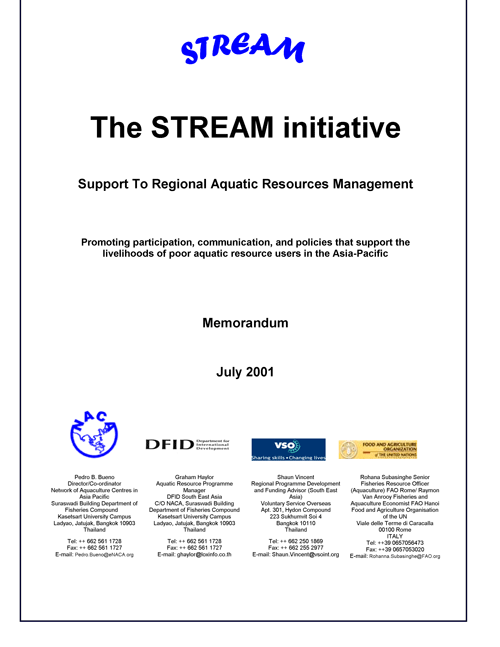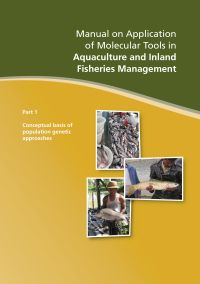The STREAM Initiative: Promoting participation, communication and policies that support the livelihoods of poor aquatic resource users in the Asia-Pacific
1 July 2001 | 1083 Downloads | .pdf | 999.17 KB | Cambodia, Gender, Governance and Policy, Livelihoods, gender and social issues, Thailand, Vietnam
Throughout the Asia-Pacific region capture fisheries and certain less intensive forms of aquaculture can and do play a vital role in livelihoods management, food security, and health and nutrition. Knowledge and experience exist that could be more effectively used in policy for poverty alleviation.
Although successful aquatic resource management case studies are available in the region, there is little documentation of lessons learned, few opportunities for dialogue and mutual learning, and sometimes poorly coordinated efforts to inform policy makers of the benefits of these approaches. As a result, awareness of successful practice among policy-makers, government agencies, regional institutions, nongovernment workers and natural resource users is low. These problems are compounded by the fact that much of the current information available on poor people's livelihoods and natural resource management issues tend to be disseminated within limited networks.
Aside from technology, many key aquatic resource management issues relate to resource access and control, the livelihoods of poor people, and governance. A key challenge must now be to establish support agencies and institutions that (i) utilise existing and emerging information more effectively, (ii) better-understand poor people's livelihoods, and (iii) enable poor people to exert greater influence over policies and processes that impact on their lives. To meet this challenge, the policies and processes of mediating institutions, and their capacity to (a) identify aquatic resource management issues impacting on the livelihoods of the poor, (b) monitor and evaluate different management approaches, (c) extend information, and (d) network within and between sectors and countries, need to be developed.
STREAM is designed within NACA’s 5-year Work Programme cycle to support stakeholders to achieve these long-term objectives. It is a regional initiative that will:
- Support capacity building among local government institutions, NGOs, and community groups involved in aquatic resources management, including the provision of training and long-term practical support in livelihoods analyses and participatory approaches, support to poor aquatic resource users to participate more effectively in policy-making processes, and encouraging the development of more responsive government institutions.
- Support a number of new community-based learning initiatives, the practical experiences from which will combine with lessons learned from existing case studies and feed into STREAM's communication strategy to influence policy and practice in the region.
- Develop a regional communications and learning strategy to realise the considerable potential that exists to facilitate lesson-learning and improved coordination between current aquatic resource initiatives in the region, increase the participation of poor aquatic resource users in decision-making processes (through the use of innovative communication approaches), and ensure policymaking is informed by lesson learning.
- Support on-going policy and institutional changes in the region, by facilitating policy development at the national level, increasing exposure to lessons and experience at the community level, maximising utilisation of the existing regional knowledge base, and providing capacity-building support to the change process.
The initiative is based around partnerships, involving at the outset a coalition of founding partners (DFID, VSO, FAO) supporting the Network of Aquaculture Centres in Asia-Pacific (NACA). It will adopt an inclusive approach, reaching out to link stakeholders engaged in aquatic resources management and supporting them to influence the initiative's design, implementation, and management.
Partnership working will be co-ordinated at the national level through National Coordinating Teams (linking a wide range of national stakeholders) and at the regional level through the STREAM Strategic Management Team). A communications matrix will link interactions and partnership activities around the STREAM objectives.
STREAM implementation will be an iterative process, piloting in year one in Cambodia and Vietnam only, where opportunities exist to tackle poverty and promote good governance. In the longer term, STREAM is committed to expanding to other countries as experience is gained, lessons are learned, impact is demonstrated, and additional funding is secured. STREAM’s communication strategy will help to increase impact, by ensuring that the region’s existing knowledge and expertise informs the ongoing change processes in Cambodia and Vietnam, and that the lessons learned in these two pilot countries are disseminated throughout the 15 NACA member countries.
STREAM will not duplicate structures but operate through existing networks and institutions, strengthening their capacity where there is a need to do so. For example, in Vietnam, STREAM will operate through the SAPA Implementation Unit, and in Cambodia, a government-NGO coalition (The Community Fisheries Bureau of the Department of Fisheries and the localising NGO SCALE). In other countries, embryonic national co-ordination initiatives might be supported, e.g., in Laos, the coalition proposed by the RDC.
STREAM will follow a process approach managed by a Strategic Management Team that is integrated into the NACA Secretariat, and provided with resources to support activities by civil society and government that deliver the initiative’s four outputs. It will follow on from the intensive preparatory work that has taken place between the coalition of partners over the last eighteen months.
NACA will establish a STREAM Initiative Trust, which will be administered by the STREAM Strategic Management Team.
External monitoring and evaluation will be carried out on an annual basis and contracted out to an independent organisation approved by and working on behalf of all donors to the STREAM trust fund. This will remove the administrative burden from donors and provide a single transparent mechanism for the coherent evaluation of the initiative.
Creative Commons Attribution.

